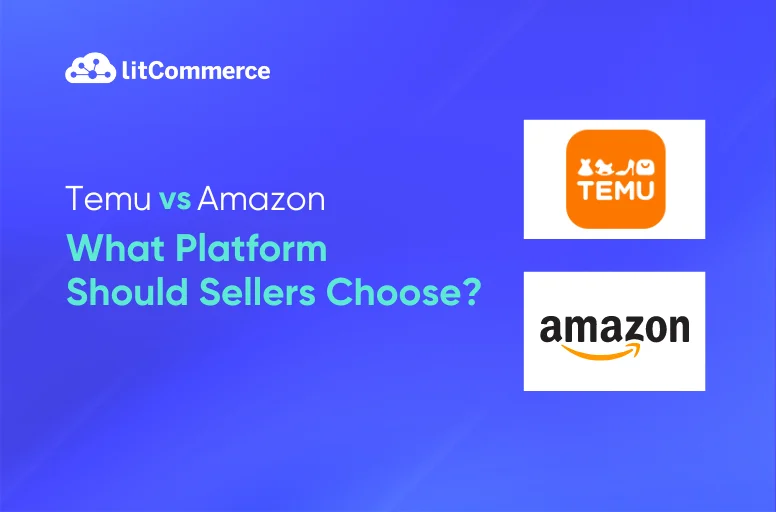Amazon vs Temu are two platforms that stand out in the world of online shopping. Both have their unique features and advantages, making them popular among buyers and sellers alike.
This article will explore how these platforms compare in various aspects, helping you decide which one might be better for your needs.
Overview of Amazon and Temu
To fully understand the competition between Amazon and Temu, it’s crucial to look at the background, business models, and market positions of these two platforms.
While Amazon has established itself as the go-to marketplace for millions of consumers globally, Temu is carving out its niche by appealing to budget-conscious shoppers and offering unique features that set it apart from the industry giant.
Amazon
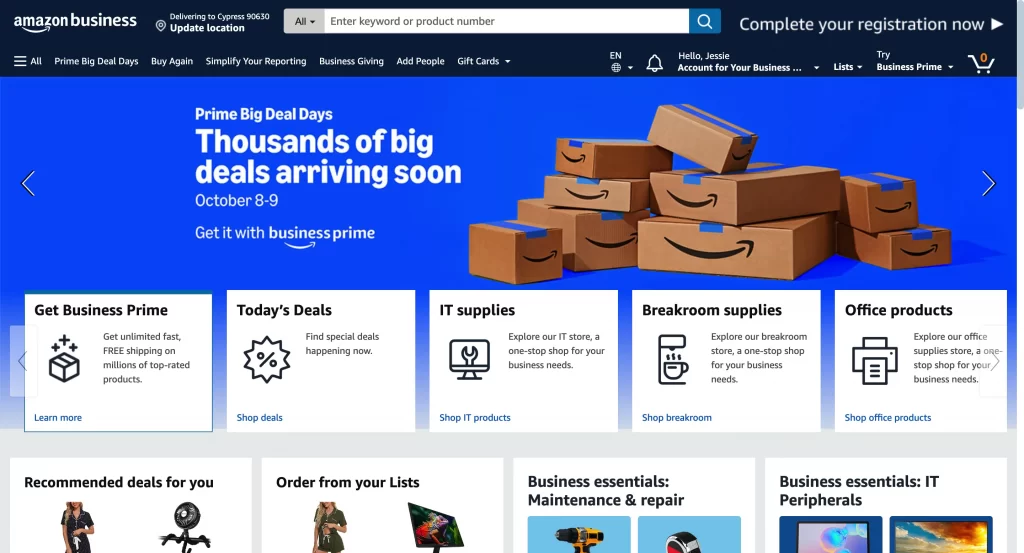
Amazon, founded in 1994 by Jeff Bezos, began as an online bookstore and has since grown into the world’s largest eCommerce marketplace. Known for its vast product selection, advanced logistics, and customer-focused approach, Amazon dominates the online retail sector.
With a market share of nearly 40% in the U.S. e-commerce market, Amazon sets the standard for online retail, yet its dominance is increasingly challenged by platforms like Temu, which offer different selling models and customer experiences.
Temu
While Amazon is a well-established giant with a diverse product range and fast shipping, Temu is a newer player that has rapidly gained traction by offering ultra-low-cost products directly from Chinese manufacturers.
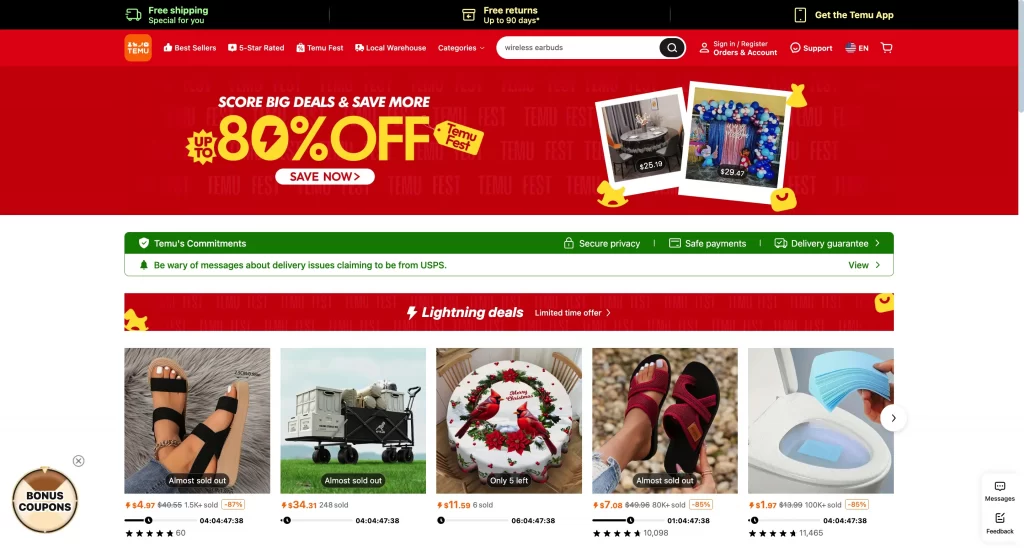
Launched in the U.S. in 2022, the platform has quickly become popular among budget-conscious consumers by eliminating intermediaries and shipping products directly from manufacturers in China.
This model allows Temu to offer significantly lower prices compared to traditional retailers like Amazon, as it benefits from the “de minimis” rule, which permits goods valued under $800 to enter the U.S. without import duties.
We did some research to compare prices between Temu and Amazon – just to see how much you can save by buying from Temu.
Take these wedge sandals as an example.
On Temu, they’re priced at just $4.58, with free shipping included.
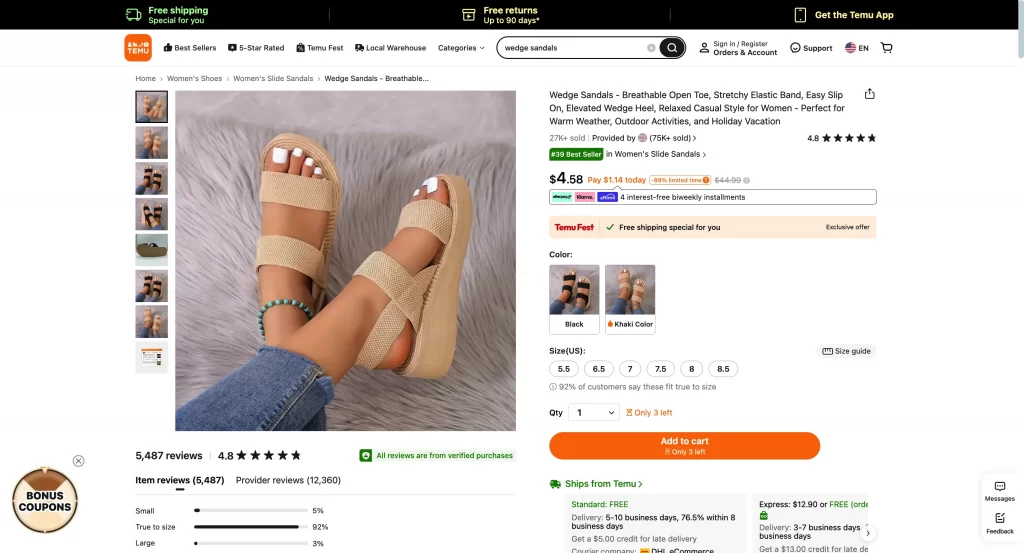
I couldn’t locate the exact same pair on Amazon, but I found several similar styles. None of them came close to that price – the lowest I found was $29, with free shipping for Amazon Prime members.

The difference in price is pretty significant. Temu’s appeal lies primarily in its low pricing strategy, with many consumers perceiving it as a cheaper alternative to Amazon.
However, this low-cost model often results in longer shipping times and variable product quality, leading consumers to manage their expectations accordingly.
Despite being a newcomer, Temu has attracted a loyal customer base and is actively expanding its reach, positioning itself as a direct competitor to Amazon’s marketplace dominance.
Can Anyone Sell on Temu’s Online Marketplace?
Yes, anyone can sell on Temu’s online marketplace, provided they meet certain requirements.
Temu has recently expanded its platform to allow U.S.-based sellers to list their products directly, moving beyond its previous model where sellers had to ship goods to China for distribution. Here’s how the process works:
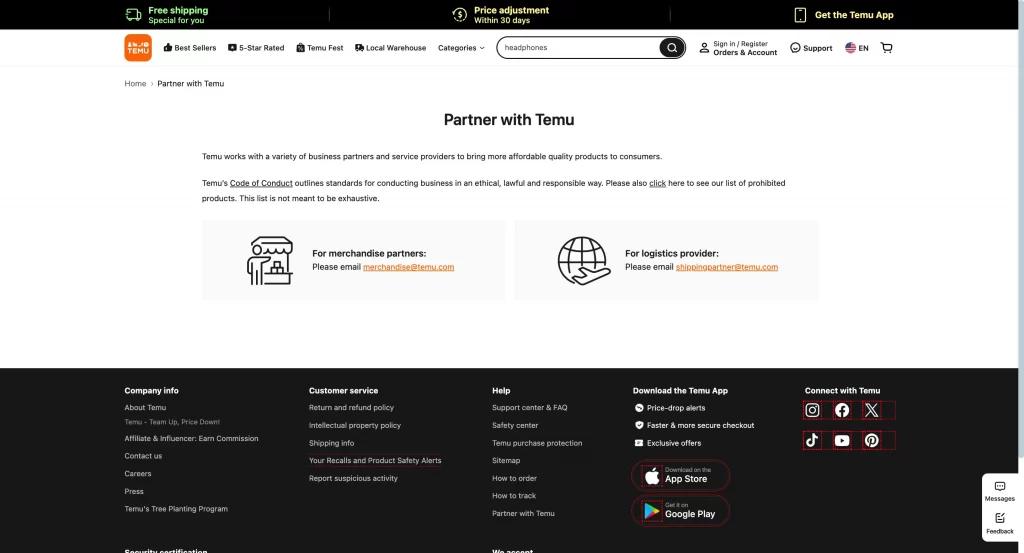
- Application process. Sellers need to request a Temu seller account. This can be done either through Temu’s partner company, Pinduoduo, or directly by contacting Temu. For direct applications, potential sellers can email [email protected] or [email protected] to obtain an invitation code and become a merchandise partner.
- Documentation. Applicants must submit various documents to verify their business legitimacy, including a business license and tax identification information. The approval process can take as little as three days.
- Setting up. Once approved, sellers can create their Temu account, add product listings, and set up order fulfillment systems. This allows them to manage their own inventory and shipping processes.
- Product listings. Sellers are encouraged to optimize their product descriptions and pricing to attract customers effectively.
Temu vs. Amazon: Pros and Cons
Choosing between Temu and Amazon involves weighing the pros and cons of each platform. Both marketplaces offer distinct advantages and disadvantages, impacting sellers and buyers differently.
Pros and Cons of Temu
Pros:
- Ultra-low prices: Temu’s business model allows sellers to offer products at significantly lower prices compared to many competitors, attracting price-sensitive consumers. This can lead to higher sales volumes if sellers can manage their costs effectively.
- Wide product range: Sellers can list a diverse array of products, from household items to electronics, tapping into various market segments and consumer needs.
- Direct shipping model: Temu’s direct shipping from manufacturers reduces logistics costs for sellers and can streamline the fulfillment process. This model also helps bypass tariffs on lower-priced items, enhancing competitiveness.
- Growing user base: Temu’s rising popularity, especially among budget-conscious shoppers, gives sellers access to a large audience quickly. It’s now one of the most downloaded eCommerce apps.
Cons:
- Intense competition: Temu’s platform is crowded with sellers offering low-cost products, making it difficult for individual sellers to stand out. This often triggers price wars that can shrink profit margins.
- Longer shipping times: Many products ship directly from China, leading to longer delivery times compared to domestic shipping options like Amazon. This delay may discourage consumers who value fast delivery.
- Quality concerns: Reports of inconsistent product quality can hurt customer satisfaction and lead to negative reviews. Sellers must source reliable products to avoid these issues.
- Complex registration process: U.S.-based sellers face a time-consuming registration process that requires extensive documentation and approvals, adding friction to onboarding.
- Potentially lower profit margins: Competing with low-cost Chinese manufacturers often pressures profit margins, especially for higher-end items. Sellers need to negotiate carefully with Temu to maintain profitability.
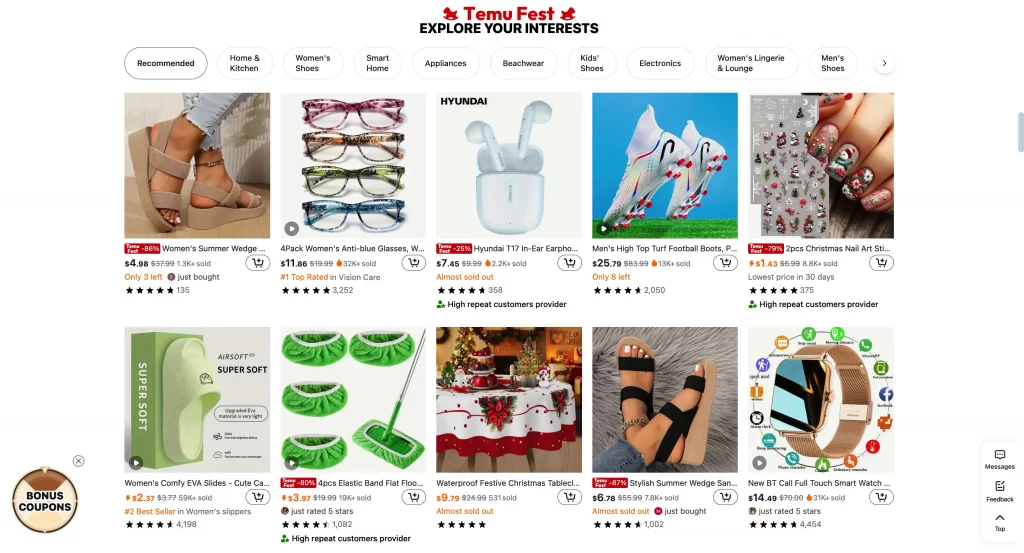
Pros and Cons of Amazon
Pros:
- Large customer base: Amazon is the world’s largest online marketplace, providing access to millions of potential customers. This vast audience increases the likelihood of sales and brand exposure.
- Robust infrastructure: Amazon offers a comprehensive infrastructure for sellers, including warehousing, fulfillment services (Fulfillment by Amazon, or FBA), and customer support. This allows sellers to focus on marketing and product creation rather than logistics.
- Trust and credibility: Amazon has built a strong reputation for reliability and customer service, which can enhance trust in products sold on its platform. This credibility can lead to higher conversion rates compared to lesser-known platforms.
Cons:
- High competition: With many sellers vying for attention in the same categories, competition can be fierce. This often leads to price wars that can erode profit margins.
- Fees and costs: Selling on Amazon involves various fees, including referral fees, closing fees, and optional subscription costs for professional accounts. These fees can significantly impact profitability if not carefully managed.
- Limited control over branding: While selling on Amazon provides exposure, it also means that sellers have limited control over their branding and customer relationships compared to independent eCommerce sites.
- Strict policies and regulations: Amazon has stringent policies regarding product listings, shipping times, and customer service standards. Non-compliance can lead to penalties or account suspension.
- Potential for direct competition: As Amazon also sells its products alongside third-party sellers, there is a risk of competing against the platform itself for visibility and sales.
Temu vs. Amazon: Key Comparisons
This section breaks down the critical areas of comparison between Temu and Amazon, focusing on factors that matter most to both sellers and buyers.
Pricing Comparison
Pricing is one of the most significant factors influencing where customers choose to shop and where sellers decide to list their products. Temu’s direct-from-manufacturer model enables it to offer products at significantly lower prices than Amazon.
This low-cost approach appeals to buyers looking for deals, but it can also create challenges for sellers in terms of maintaining profit margins.
Key Points:
- Temu: Known for its low prices, often undercutting Amazon by sourcing directly from manufacturers. However, the focus on low prices can sometimes result in compromised product quality.
- Amazon: Typically offers a broader range of prices, catering to various consumer segments. While often more expensive than Temu, Amazon’s price reflects its higher quality assurance and faster delivery times.
Sales performance
Sales performance varies greatly between the two platforms, influenced by factors like customer trust, market reach, and pricing strategies.
Key Points:
- Amazon: Dominates in terms of sheer sales volume, benefiting from high traffic and a loyal customer base. Amazon’s powerful advertising tools also allow sellers to boost visibility and sales.
- Temu: While still growing, Temu’s sales performance is bolstered by its competitive pricing and unique shopping features. However, sellers may face challenges due to lower average order values and less mature marketing tools.
Product Quality
Product quality is another major differentiator between Temu and Amazon, directly impacting customer satisfaction and repeat purchases.
Key Points:
- Temu: Offers a wide variety of products, but quality can be inconsistent due to less stringent controls and reliance on various suppliers.
- Amazon: Generally offers higher quality products with rigorous standards for sellers, particularly those using FBA. Customer reviews and ratings also play a significant role in maintaining quality.
Is Temu Going to Steal My Amazon Customer Base?
Temu is unlikely to take your entire Amazon customer base. However, it could attract price-sensitive shoppers from your listings.
With its aggressive pricing and direct-from-manufacturer model, Temu offers prices up to 60–80% lower than Amazon. This significant cost advantage appeals to budget-conscious buyers focused on savings over other factors.
Still, Amazon holds key advantages that make it difficult for Temu to fully capture its market. Amazon has earned strong customer loyalty with reliable delivery, superior service, and an expansive product selection. Many shoppers trust Amazon as a more convenient and dependable option. According to Fortune, only 6% of Americans surveyed trust Temu more than Amazon.
Additionally, Amazon’s extensive review system and reputation for quality products can influence purchasing decisions positively. While Temu attracts a growing user base and offers unique products, Amazon’s vast catalog and established credibility make it hard for Temu to replace Amazon as the preferred platform.
Main Differences Between Temu’s and Amazon’s Business Models
Understanding the fundamental differences between Temu’s and Amazon’s business models is essential for sellers looking to choose the right platform. These differences impact how each platform operates, attracts customers, and supports sellers.
Direct vs. marketplace models
The business models of Temu and Amazon differ significantly across several dimensions, including product sourcing, pricing strategies, shipping methods, and target audiences. Temu primarily sources products directly from Chinese manufacturers, allowing it to offer ultra-low-cost items by eliminating intermediaries and reducing associated costs.
This strategy results in lower prices for consumers, making Temu particularly appealing to price-sensitive shoppers. For instance, a portable neck fan might cost $8 on Temu compared to $31 on Amazon. In contrast, Amazon operates a mixed model that includes both third-party sellers and its inventory, resulting in a wider range of price points that accommodate various consumer preferences. While Amazon also offers competitive pricing, it generally features established brands alongside generic options.
Shipping methods further highlight the differences between the two platforms. Temu often has longer shipping times because products are shipped directly from China, which can be a drawback for consumers accustomed to faster delivery options. However, Temu mitigates this concern with a generous return policy that includes free return shipping within 90 days.
On the other hand, Amazon is renowned for its fast delivery services, particularly through its Prime membership program, which offers same-day or two-day shipping on millions of items—a key competitive advantage.
Target customers
The target audiences for each platform also vary. Temu primarily appeals to price-sensitive consumers seeking deals on low-cost items, often using social media promotions and referral programs to attract younger demographics.
In contrast, Amazon caters to a broader audience that values not only low prices but also fast shipping, product variety, and reliable customer service. Its extensive product catalog addresses diverse consumer needs, from everyday essentials to specialty items.
Finally, the seller environment and policies differ between the two platforms. Temu provides a less saturated marketplace compared to Amazon, potentially allowing sellers to stand out more easily; however, it mainly caters to manufacturers and brand owners rather than individual resellers.
You may also like: Can I Resell Temu Products? Step-by-steps Guide for Sellers.
Conversely, Amazon has strict policies regarding seller conduct and product quality to maintain its reputation while offering robust support for sellers—albeit with various fees that can affect profitability. Overall, these differences create unique opportunities and challenges for sellers depending on their business strategies and target markets.
Revenue models
The revenue models of Temu and Amazon exhibit fundamental differences that reflect their distinct approaches to eCommerce.
Temu operates on a low-cost, direct-to-consumer model, primarily sourcing products directly from manufacturers in China. This strategy allows Temu to offer significantly lower prices by eliminating intermediaries and avoiding additional costs such as tariffs and middleman fees. For example, items sold on Temu can be priced much lower than similar products on Amazon, appealing to price-sensitive consumers. Temu’s revenue is largely driven by high sales volume of inexpensive items, which has contributed to its rapid growth and substantial user base.
In contrast, Amazon employs a multi-faceted revenue model that includes both direct sales and a marketplace for third-party sellers. Amazon generates revenue not only from the sale of its own products but also from fees charged to third-party sellers who list their items on the platform.
These fees can include referral fees, fulfillment fees for using Amazon’s logistics services, and subscription fees for services like Amazon Prime. This diversified approach allows Amazon to maintain a vast product selection and cater to a broader audience, including consumers who value fast shipping and customer service alongside competitive pricing.
Trust and reliability
Trust and reliability are also important considerations for consumers. Temu’s focus on low prices and direct shipping from China can raise concerns about product quality and reliability among some consumers.
Amazon, however, is known for its trusted brand reputation, reliable delivery, and consistent customer service, which are key factors in building consumer trust. To mitigate concerns about product quality and shipping times, Temu offers a generous 90-day free return policy, while Amazon also has a robust returns and refund policy, though specific terms may vary based on the seller and product category.
Temu vs Amazon: Conclusion
In conclusion, both Temu and Amazon present unique opportunities and challenges for online sellers. Amazon, as a well-established marketplace, offers unparalleled reach, a massive customer base, and comprehensive seller tools. However, its high fees and intense competition can be drawbacks for new or small sellers.
On the other hand, Temu is an emerging player with lower selling fees and a focus on affordable products, making it an attractive option for sellers looking to tap into a growing market. However, its limited reach compared to Amazon and its early-stage development may pose challenges for those seeking broader exposure.
Ultimately, choosing between Temu and Amazon depends on your business goals, product type, and market strategy. Temu may offer a low-cost entry point with potential for growth, while Amazon provides vast resources for scaling your business.
Ready to maximize your sales across both platforms? Discover LitCommerce, the ultimate multichannel selling solution that allows you to seamlessly manage your listings on both Temu and Amazon, helping you grow your e-commerce business with ease.

